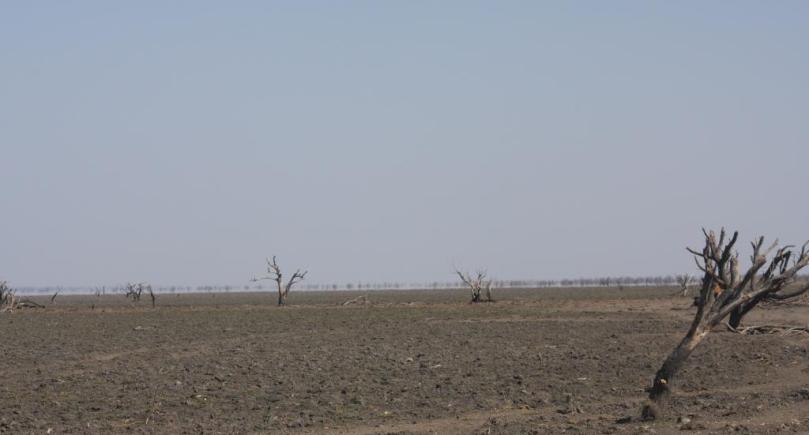
‘You must call the San Man,’ she whispers. ‘Only he can bring the rain bull.’
‘But how?’
‘You must go to the cave which watches over the veld. Go at dusk, light a fire.’ She reaches into the pouch she has beside her and holds out a handful of grey-green herbs. ‘Burn a little of this; and then watch and wait.’
He raises his eyebrows at his two companions.
The old woman holds up a finger. ‘He may not come the first night,’ she shakes her head slowly. ‘He may not come at all.’ She stares intently at each of them. ‘Now go.’
The three men depart.
‘I guess it’s worth a try,’ says the first. He is a tall, robust white man, dressed in shorts and sandals; the hint of an overseas accent.
‘Another winter with no rain; we must do something,’ agrees the second, a brown-skinned man, whose features echo the ancient people that once inhabited this corner of Africa.
The third man, by far the youngest of the three is silent. He too is brown-skinned, a son of the Rainbow Nation, where a multitude of peoples have planted their seeds.
Later, the three trudge silently up to the koppie where the ancient cave paintings are. The air is hot and parched like the veld. The sky turns liquid orange as the sun is swallowed up by the smudge-blue mountains. They light the fire and sprinkle herbs onto the flames. The three settle down to watch and wait.
/…to be continued
Today is a public holiday in South Africa. The Day of Reconciliation came into effect in 1995 after the end of apartheid, with the intention of fostering reconciliation and national unity for the country.
The characters in this new story represent (some of) the different groups in this country and the story has its roots in some earlier pieces I wrote about the rain animal my mythical, mystical San Man. There is more to tell of the story.
The struggle for water is a perennial and worsening challenge in many parts of the world. It was starkly brought home to us last year when Capetonians faced ‘Day Zero’, the day when the taps would run dry. The crisis was averted, but we still cannot waste a drop and must search for other ways to bring water to the thirsty land.
Oh wow! I didn’t realize it was like that with the water! We have droughts in California and it sparks and exacerbates wildfires throughout the state, but not where whole cities are threatened to go dry like that. That is scary. Also I’m looking forward to the new continuing story!
LikeLiked by 1 person
It was worrying all last summer, and we’re still on ‘short rations’ now. All is manageable though. Our fire season will soon be upon us too. There have been some serious bush fires over the past few years. Poor wild creatures.
I’m looking forward to telling the new story too 🙂
LikeLiked by 1 person
Brilliant vivid story – sheds light on an serious ongoing issue! Great world-building 🙂
LikeLiked by 2 people
Thanks, Tom 🙂 It also ties in with a strand in the story line of the novel I’m working on. I’m not entirely sure where that’s going at the moment, so I’m giving it a break until next year. it needs a little distance after NaNo.
LikeLiked by 1 person
Really looking forward to reading more of this, I loved you San Man stories. I watched a documentary on Netflix about water shortages and how in some parts of the world bottled water companies are taking water from public supplies at incredibly low prices to maximise their profits, leaving locals with barely enough to get by and farmers unable to grow crops. You couldn’t make this stuff up.
LikeLiked by 2 people
There are a lot of unscrupulous people out there. Last year we saw a lot of trucks carrying bulk water to sell to top up people’s swimming pools (!!!) most of that was illegally pumped from rivers. Thankfully that’s been stopped. The situation is mostly under control in urban areas now, but the Karoo farmers are having it very tough. There seems to be no solution.
Come, San Man!
LikeLike
This is so cool and engrossing
LikeLiked by 1 person
Thanks Jude 🙂
LikeLiked by 1 person
[…] /… previously […]
LikeLike
I missed this somehow. In a way, I’m glad I did because I can now go to the 2nd part.
New follower of San Man stories.
LikeLiked by 1 person
Welcome to dreamland, Darnell 🙂
LikeLike
You seem very stoical about the water shortage. Is it climate change or does it come with the territory?
LikeLiked by 1 person
It’s a combination of both, together with mismanagement in the maintenance of our dams/reservoirs. We have a Mediterranean-type climate here in the Western Cape with hot dry summers and cooler wet winters. The winter rains have failed to come over a couple of years, hence the crisis. It’s not so bad for us here, but further north, for many of the Karoo farmers in particular, it’s a disaster.
LikeLiked by 1 person